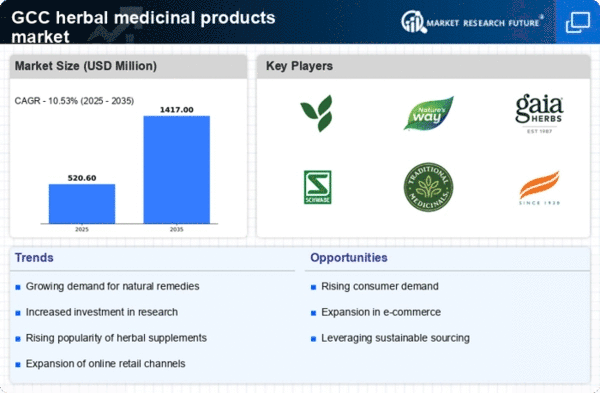The GCC Herbal Medicinal Products Market has showcased significant growth, primarily driven by an increasing consumer shift towards natural remedies, wellness, and preventive healthcare measures. Such a transformation is influenced by rising health consciousness among the population and a burgeoning interest in traditional herbal remedies that are perceived to be safer and more effective than conventional pharmaceuticals. Competitive insights reveal that players in this segment are focusing on product innovation, quality improvements, and the development of holistic health solutions to capture the growing consumer mindset.
This market is characterized by a blend of both established international brands and local players who are keenly aware of the unique cultural and health practices within the GCC region. The competition is intensifying, with companies striving to enhance their distribution networks and marketing strategies to solidify their presence and appeal to diverse consumer bases. Nature's Way has established a notable presence in the GCC Herbal Medicinal Products Market, recognized for its commitment to quality and efficacy in herbal supplements and natural products.
The company’s strengths lie in its extensive range of products that cater to various health needs, bolstered by a strong reputation for utilizing high-quality ingredients. Nature's Way has effectively capitalized on the organic trend that resonates deeply with consumers in the GCC, particularly those keen on sustainable health practices. Their ability to adapt to local preferences while maintaining international quality standards has enhanced customer trust and loyalty in the region.
Furthermore, the company is known for its proactive marketing strategies, leveraging educational campaigns that inform consumers about the benefits of herbal products, which has significantly driven brand awareness and market penetration in the GCC. Lush Fresh Handmade Cosmetics has carved out a niche in the GCC Herbal Medicinal Products Market by blending high-quality herbal ingredients with a strong ethical branding approach. Known for its fresh, handmade products, Lush emphasizes the use of natural ingredients free from harmful chemicals, positioning itself as a go-to brand for consumers seeking ethical and eco-friendly options.
The company offers a diverse range of products, including skincare, body care, and hair care, with an emphasis on incorporating herbal and botanical extracts that promote holistic wellness. Lush’s market presence in the GCC is further strengthened by its unique retail concept that provides a sensory shopping experience, enhancing customer engagement. The brand's strengths lie in its storytelling around product sourcing and sustainability, which resonate well with conscientious buyers. Additionally, Lush has actively pursued partnerships and localized product offerings that meet the specific tastes and cultural practices of the GCC population, further consolidating its foothold in the herbal sector.
Through strategic collaborations or limited-time offerings, Lush continues to innovate and maintain relevance in this dynamic market, showcasing its commitment to growth despite competitive pressures.

















Leave a Comment